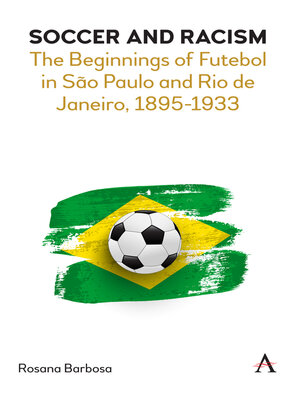Soccer and Racism
ebook ∣ The Beginnings of Futebol in São Paulo and Rio de Janeiro, 1895-1933 · Anthem Critical Introductions
By Rosana Barbosa

Sign up to save your library
With an OverDrive account, you can save your favorite libraries for at-a-glance information about availability. Find out more about OverDrive accounts.
Find this title in Libby, the library reading app by OverDrive.



Search for a digital library with this title
Title found at these libraries:
| Library Name | Distance |
|---|---|
| Loading... |
This book aims to use soccer as a tool to understand key elements of Brazil's history from the overthrown of the Monarchy in 1889 to the 1930 Revolution that brought Getulio Vargas to power—the so called First Republic. More specifically, this book will show that the advent of soccer and the reactions of the elites toward this sport can be understood primarily as a consequence of the desire of the new Republic—crucially influenced by racist attitudes integral to Social Darwinism—to be included within the white civilized world. Thus, racism during the early years of football in that country was influenced by the eurocentric views of the world in racial terms and the Brazilian elites desire to be accepted by the civilized white world.
|The book looks at the turn of the century, when organized soccer began to be played in a systematic way by the European community of Rio and São Paulo, mostly by the British. It shows that the new sport was embraced by these people as a way to celebrate their culture, and to imitate the activities of the elite schools in Britain that became quite popular throughout Europe. Young Brazilians from the elite also embraced the sport as a way of sharing a popular European sport that was identified with what was respected as a white/upper class activity. In this way making a distinction from the lower and darker populations. Making this distinction was important in this moment of post-emancipation, affirming the superiority of the upper/white class. It was also important for the European residents of Brazil in order to distinguish themselves from Brazilians (colonial mentality). Football was one aspect of the modernity that these two cities were craving to achieve.
The book highlights the impact of European-based racial assumptions on the development of professional soccer. It provides a broad discussion on how the official discourse after 1930 was one of conciliation, claiming that Brazil was not European, but unique due to its racial mixing. This idea began to be promoted by artists and intellectuals as an attempt to Brazilianize the country, but it was soon embraced by politicians with the leadership of President Getulio Vargas in an attempt to create a unified national identity. In this context, futebol was also unique in relation to European football because of its mulatoism. Although this new attitude would influence social and racial barriers within football to fall, racism did not end, nor did Brazil become a racial democracy – as it has been claimed by many.







